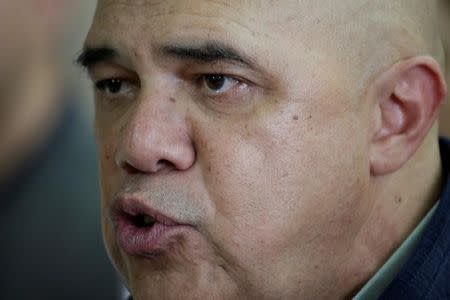Venezuela opposition says Vatican-brokered talks 'frozen'
By Corina Pons and Alexandra Ulmer CARACAS (Reuters) - Venezuela's opposition said on Wednesday talks with the government were "frozen" after officials failed to attend meetings, throwing cold water on Vatican-brokered attempts to bridge the country's deep political crisis. Though the formal talks, which began last month, appeared to have led to the release of a handful of detained activists, hopes for real rapprochement were always slim. The two sides are fundamentally at loggerheads, with the opposition seeking the ouster of Socialist President Nicolas Maduro, while authorities vow he will not leave office before his term ends in 2019. "The government, in an irresponsible manner, froze the dialogue process by not showing up to two technical meetings last night," opposition coalition leader Jesus Torrealba told Reuters. Opposition activists said authorities backed away after the National Assembly on Tuesday held a heated session in which they slammed Maduro over a drug scandal. Two nephews of Maduro's wife were found guilty this month on U.S. charges that they tried to carry out a multimillion-dollar drug deal to help their family stay in power. "The government is using the debate as an excuse," said two-time presidential candidate Henrique Capriles, accusing authorities of not being committed to talks. "The government has not complied with any of its promises. They promised to free political prisoners; there are more than 100 imprisoned. They promised (to open) a humanitarian channel; not a single medicine has come in." Maduro acknowledged "difficulties" in the talks but said they were still on track. "The dialogue is advancing ... and by January, February or March, it will be strengthened," he told reporters. It was not clear if the opposition would resume a more militant agenda, which before the talks included protests and putting Maduro on trial before the National Assembly. International figures trying to facilitate dialogue, including Spain's ex-Prime Minister Jose Luis Rodriguez Zapatero and U.S. diplomat Thomas Shannon, were shuttling between both sides. Dialogue had divided the diverse opposition coalition, with some activists feeling the government was duping the opposition to buy time. The situation in oil-rich Venezuela has worsened in the last months, with a recession leaving millions unable to find or afford food amid shortages and spiraling inflation. The opposition blames Maduro, who is unpopular, and has been vying to remove him via a recall referendum. The former bus driver and union leader, however, has said the opposition is seeking a coup against him and has vowed to end his term. (Additional reporting by Eyanir Chinea, Andrew Cawthorne and Girish Gupta; Writing by Alexandra Ulmer; Editing by Lisa Shumaker and Alistair Bell)



